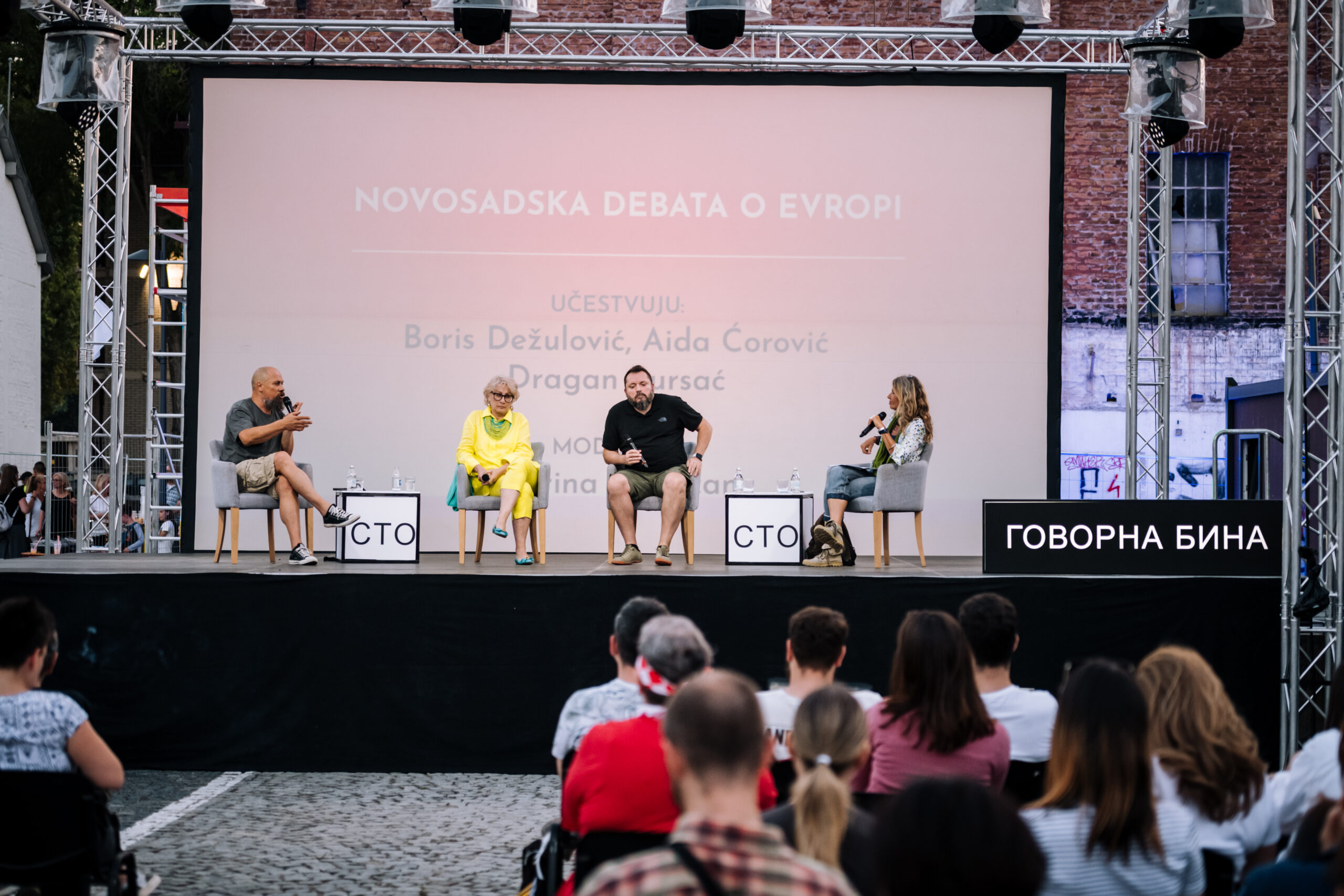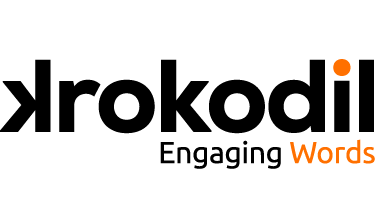
20 Jul Dežulović: In present-day Europe, the right-wingers work by the same principles as the left-wingers used to / KROKODIL Festival 2022 Novi Sad edition – 23rd June
The first evening of the KROKODIL Festival in Novi Sad kicked off with the ‘Debate on Europe’. It was moderated by journalist Marina Fratucan and the participants were Aida Ćorović, Dragan Bursać and Boris Dežulović. ‘I wish I could welcome you in a city that didn’t have fascist graffiti’, said Marina Fratucan at the beginning of the debate, adding that fascism on the walls was sadly not a new topic, just a revived one. ‘A wall is the space through which fascism communicates with the public. It is simply a public space, and scribbling graffiti is nothing else but pissing on history, marking a territory”, Boris Dežulović said. He added that in the 1970s and 1980s, graffiti was a subversive idea, which was now taken over by the right-wingers. ‘Over the past ten years, we’ve witnessed a full comeback of the 1990s, in a big way. All of the same people are here except for Slobodan Milošević. This thing with the mural is a clear signal, and the government is saying, ‘Yes, Ratko Mladić is our hero, we’ve committed genocide, we stand behind it, we’ll do it again if we get the chance’, said activist Aida Ćorović commenting on the mural in Belgrade’s Njegoševa Street. ‘The state systemically stands behind these people, these individuals. The individuals who draw the graffiti are simply the tools that do the job and that’s it. Everything else is either the state or an entity, there is no doubt about it’, observed Dragan Bursać, agreeing that the situation was not better in Bosnia and Herzegovina either. Boris Dežulović admitted that he couldn’t be optimistic about what was happening, ‘We can always do worse, our capacity and resources to do the worst are infinite’. Dragan Bursać, however, believes that it will be better in 2044 if people started working with their children today.
GIGANTOMACHY: Which is ‘better’: Belgrade Waterfront or Novi Sad Waterfront? In this popular KROKODIL format, historian Dubravka Stojanović and writer, art historian and civil activist, Novi Nebojša Milenković, exchanged views on the current urban planning issues. In a verbal duel where each side was given 3 minutes to respond before the bell rang, numerous contradictions between these two projects were exposed.
Milenković emphasised the role of the citizens: ‘The ruling political caste has killed what democracy, what elections, are all about. Winning the elections doesn’t mean becoming the owner of a city. Citizens own their cities. It’s just that they have forgotten they do’. Dubravka’s quip that ‘investors are now the owners of the city’ gave the theme a new framework.
In the segment called ‘At the Podium’, Boris Buden gave a talk titled “The West at War: On the Self-Enclosure of the Liberal Mind’. The philosopher, cultural theorist and publicist spoke about the conflict in Ukraine and how it related to the Balkan experience of conflict throughout history. Quoting August Cesarec, ‘Because only a terrible cry over the meaninglessness accelerates the whisper of a new meaning’, Buden stressed the need to protest loudly against the reality of a meaningless war. Because the potential for the situation to escalate is endless.
When it comes to what the West is today, Buden said that it’s hard to tell. In the context of war, this is a conflict between two identity blocs, the West and the Russian world. But it is hard to define the West. If this is a conflict between two identities, Putin’s opposition has the wrong perception because it interprets everything either through the West or through Putin. Since there is nothing in between, there is no developed critical thought and it is this very situation that makes it possible for him to rule for such a long time. Buden sees many inconsistencies in Putin’s reasons for aggression: Denazification of Ukraine – where he had to start from Russia and the ultra-right position: ‘I am all for denazification. Let’s start from Putin himself”; Demilitarisation – which is not realistic because it needs to include all three parties (the West, Ukraine and Russia): It’s too late for it; NATO getting closer – not enough of a reason to start a war.
Buden pointed out that whether Russia won the war or not, it will not cease to exist as such. Which is important in the context of future international relations.
The charismatic philosopher’s incredible talk gave us a lot of food for thought. Another interesting point was that in Bolshevik Russia, in 1918, women had the right to divorce, abortion was legalised, homosexuality was decriminalised, and transgender marriages were allowed. A hundred years later, we are where we are. But we have the Krokodil Festival, to make us think and wonder. A literary regional gathering that alleviates boredom and lethargy.
The report was prepared by KROKODIL journalists for a day Sanja Urošević and Milica Đorđević.
The project Journalist for a Day – Journalists against Racism is implemented as part of Reporting Diversity Network 2.0 funded by the European Union.



Sorry, the comment form is closed at this time.